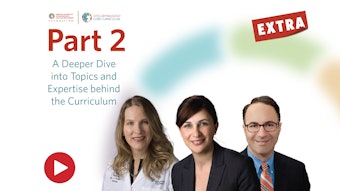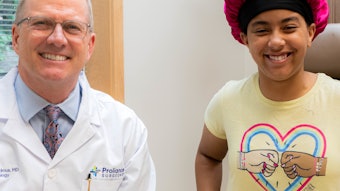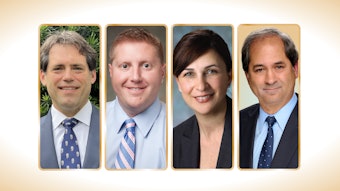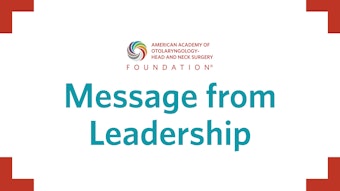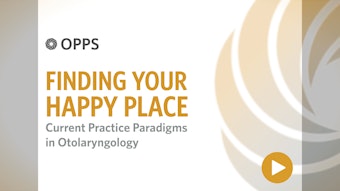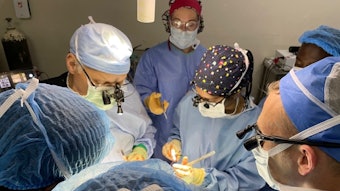A Culture of Perfectionism Is Poisoning Young Surgeons
We surgeons function under the assumption that surgery is a perfectible thing. If surgery is not a perfectible thing, then is perfectionism required in the training of young surgeons?
Melinda (Mel) Thacker, MD

Yet, we surgeons function under the assumption that surgery, like the building of an aircraft, is a perfectible thing. We believe that if we give surgical residents ample opportunity to master an operation, teach them to sacrifice their own needs for the needs of patients, ensure they know how high the stakes are, encourage a state of fear, instill in them a respect for the academic hierarchy, and shame them when they make a mistake, then we can create the perfectly able surgeon. It is this desire—to make an un-perfectible thing like surgery into a perfectible process—that fuels perfectionism and shame culture in surgical training.
We don’t often consider perfectionism to be a form of shame, but it is. And that’s exactly how surgical training gets away with shame culture: it disguises shame as perfectionism and calls it necessary. If surgery is not a perfectible thing, then is perfectionism (and therefore shame) required in the training of young surgeons?

What perfectionism isn’t:
- Striving for excellence. Perfectionism is not the belief that failure is inevitable on the path to success nor does perfectionism view mistakes as opportunities to learn. Instead, perfectionism says: we can’t move forward until we know we will do the thing perfectly or else we risk being shamed, blamed, and judged by others.
- Self-improvement. Perfectionism is other-focused (“how will I be perceived?”) not self-focused (“how can I improve?”). Perfectionism is about receiving approval and external validation for executing perfectly. Perfectionism says that as long as we perform perfectly, we are worthy and good enough. Perfectionism leaves no room for self-improvement. We can’t learn how to do something better when we have already perfected it.
- The key to success. Perfectionism does not beget success but instead hampers it. Perfectionism paralyzes us from acting for fear of failure, fear of making a mistake, or fear of being criticized. Willingness to try and fail—regardless of how we are perceived—is what actually leads to success.
- A way to avoid shame. Perfectionism is a form of shame, so where you find perfectionism you’ll always find shame. And the culture of surgical training is full of both.
What perfectionism is:
- Fuel for the thought: If I do things perfectly, then I can avoid feeling shamed, blamed, and judged by my peers.
- An unattainable goal. Perfectionism is more about perception than internal motivation. As long as others perceive us as perfect, we have achieved perfection. But here’s the rub: we have zero agency over how others perceive us; therefore, perfection in the eyes of others can never be achieved. Perfectionism is the illusion of being perceived as perfect.
- Self-destructive. Perfectionism sets us up for shame and self-blame. We tell ourselves a story of not being “good enough” and feel the need to beat ourselves up as punishment. There is no room for self-compassion or kind internal self-talk in the face of perfectionism.
- Addictive. Perfectionism creates a game of chasing our own tail. We think we feel shame because we aren’t perfect enough, so we try to be more perfect, but we never actually reach perfection. Round and round we go. We buy into perfectionism instead of questioning the faulty logic and unattainability of it.
With this knowledge, what can be done to reduce perfectionism and shame in the culture that trains young surgeons? The fix could be simple, but simple isn’t easy. The antidote to perfectionism is simply compassion. For young surgeons, compassion is loving ourselves when we make mistakes, making the decision not to buy into our tendency to judge other surgeons when they make mistakes, rejecting the temptation to Monday morning quarterback, giving ourselves and our peers the benefit of the doubt, leaning into our human tendency to err, loving ourselves and each other despite our missteps, and genuinely caring about our own well-being and the well-being of our peers as much as we care about the well-being of our patients. The implementation of compassion, however, takes attention, effort, and repetition, and it starts with how we treat ourselves.
“Compassion culture says: You are perfect, whole, and complete exactly as you are. You always have been, and you always will be.”
Compassion for others begins with compassion for ourselves. Treating ourselves better is the jumping off point to treating each other better. Dr. Kristen Neff,2 a prominent researcher in self-compassion, describes three important components of self-compassion: kind self-talk, common humanity, and mindfulness.
1. Kind self-talk. In surgery, kind self-talk does not have to be a grand gesture or a forced, untrue thought like, “I’m the best surgeon in the world!” It can simply be the absence of typical default, learned self-flagellation. Say you make a mistake in the operating room: you accidentally create a perforation in both flaps during a septoplasty, for example. With self- compassion, your internal dialogue changes from: “Why can’t I do this? What would so- and-so (mentor from training) think?!” to something like: “Let’s pause for a second and assess the situation. It’s a tiny posterior perforation that is unlikely to be symptomatic, so I’ll just let the patient know” or “this perforation will need repair and the steps to do that are going to be …”
2. Common humanity. Sharing our story with others and hearing them say, “Me, too. I’ve been there. You’re not alone.” is an essential part of self-compassion. Empathy from our peers shows us that we are all in the same boat together and that there are people out there having similar experiences as us. We have been cultured not to discuss our mistakes openly. Perfectionism warns us to keep them secret or else be shamed, but the only way to process through and move beyond shame is to shed light on those mistakes and be witnessed in the telling of our story in a brave, safe space with people we trust.
3. Mindfulness. The term “mindfulness” has been thrown around so often that it may seem to have lost meaning to many of us, though it is an essential part of self-compassion. Mindfulness doesn’t require an app or hours of meditation. It is a simple, albeit non-intuitive, practice we can implement privately in our own brain in the operating room and in clinic. And, like, self-kindness, it is a practice that requires intention, attention, and effort. When we are mindful, we are no longer controlled by our thoughts and feelings but are instead observing them non-judgmentally, and in doing so, we step outside of the whirlwind vibration that negative thoughts and feelings create.
In the example of the inadvertent creation of a septal perforation, negative thoughts may automatically arise followed by feelings of anxiety, shame, overwhelm, and resistance. Instead of buying into those thoughts and feelings, we can alternatively choose to observe them, like we were observing an animal in the wild. “Hmmm, I’m thinking the thought that I am a bad surgeon, and that is creating feelings of shame and anxiety. I’m going to watch those emotions and see where they go. Ok, my heart rate went up and there’s a pit in my stomach. I wonder what sensations will appear next …”
Contrast this to buying into the sensations and having a mini internal freak-out mid surgery that we try to suppress with only partial success. The scrub tech, circulating nurse, and anesthesiologist are going to sense an energy shift in us. And it could derail us for the rest of the day. This is where mindfulness can prevent an amygdala “hijack” and keep us calm and focused.
A Case for Compassion Culture in Surgery
Our current model of training produces very able surgeons, but is it because of the culture or despite it? More than 60% of physicians are struggling with burnout.3 There are 300 to 400 physician suicides per year. Notably, in the U.S., women physicians commit suicide at a rate 250%-400% higher than women in other professions.4 Physician discontent and disconnection is an epidemic, and surgeons are at the forefront. Although there are many causes of surgeon burnout—the corporatization of medicine, perceived lack of control, mind-numbing bureaucratic tasks, too much work, and insufficient compensation being some of them—these suspected causes of burnout are all external circumstances. Surgeons are ill-prepared to face challenging external circumstances when their internal milieu is poisoned with shame, fear, and the illusion that is perfectionism.
One of my surgeon acquaintances has told me a story related to a patient complication, the details of which are just as vivid for them today as they were a decade ago when the event occurred. It’s the story of an undernourished patient with head and neck cancer who underwent an uncomplicated laryngectomy and then died of postoperative complications one month later. They wish they would have defied tumor board recommendations and pushed for chemotherapy and radiation instead of surgery. The shame of the patient’s death will most likely haunt them forever.
And it’s not just the perfectionism-driven, complication-related shame that unexpectedly besieges us. Other surgeon acquaintances of mine talk about the shame attack that hits when they are blindsided by a board complaint, and the shame and isolation that inevitably accompanies a malpractice lawsuit. In the award-winning podcast series, Shame in Medicine: The Lost Forest5, Adrian Anzaldua recalls being a third-year medical student on surgery rotation and encountering a list titled “The Perfect Surgery Student.” He reads through it, then quickly realizes, “I’m not this person. I’ve never been this person.” Shame, that painful feeling of believing we are flawed and therefore unworthy of love and belonging, is an emotion that pretends to be useful when it is disguised as perfectionism; we learn it early in medical education, then we use it against ourselves throughout our careers, and the result is a lot of physicians creating their own unnecessary suffering.
Why does perfection culture persist in surgical training? Perfectionism, and therefore shame, in surgery makes sense. If budding surgeons were not taught to demand perfection of themselves - if they were encouraged to lean into mistakes instead of fearing them—then they will inevitably get sloppy, and patients will get hurt. We can’t have a pro-failure, pro-mistake attitude when we are dissecting the facial nerve. That would be crazy!
Compassion isn’t crazy though; it is essential for the transformation of a culture from one of perfectionism and shame to one of transparency and acceptance. A culture of compassion promotes confidence in its trainees and teaches young surgeons how to enter the working world sustainably, with a strong sense of self-respect, authenticity, and an ability to set healthy boundaries. The current culture assumes young surgeons need external pressure to do the right thing: Step out of line, make a mistake, and you will be shamed. The culture assumes fear need be the fuel for error-free surgery. (This is serious business. One wrong move, and you have a complication on your hands) without realizing that a fear-based mindset perpetuates anxiety and blocks surgeons from easily accessing higher cognitive functions — the exact functions they need to access when they are faced with a complication.
A question that those of us who train surgeons must ask is: How much do we trust the surgical trainees learning under us? Answering that question for ourselves and being compassionately open and honest with our trainees is essential. Do we trust young surgeons to strive for excellence, to improve, to succeed, to become the best physicians they can be and to take excellent care of patients? Can we meet young surgeons where they’re at without judging them or imposing the hierarchy of worthiness upon them? Can we model compassion for them by being compassionate with ourselves and teach them how to have compassion for each other and to model it for younger trainees learning under them? Having an authentic, nonjudgemental conversation about these questions is how malignant residency programs dissolve into memories of the past.
When we open a space where mistakes are normalized and talked about openly and honestly, as opposed to the finger-pointing shame fest that is a typical surgical morbidity and mortality conference, we gather data more readily and find areas where we can improve without blaming the individuals who made the mistake. That is compassion culture. No matter the mistake or complication—even the big ones—it’s important to ask ourselves: “What would a compassionate response for all parties look like?” We can consciously choose compassion without risking harm to anyone. Compassion for a surgical trainee who inadvertently causes a surgical complication does not downplay the need for compassion for the patient and the patient’s family affected by that complication. We can do both. By doing so, we open up a world where surgical trainees feel safe at work, where they’re no longer distracted by fear, where they are able to tap into their own curiosity and intuition, where they are allowed to show up as their authentic selves with all of their idiosyncrasies, quirks, and non-neurotypical tendencies, without being told (explicitly or not) that they are bad or wrong because they don’t fit the mold of the “ideal surgical resident.”
Compassion culture says: You are perfect, whole, and complete exactly as you are. You always have been, and you always will be.
References
- Brown, B. (2012). Daring Greatly: How the Courage to Be Vulnerable Transforms the Way We Live, Love, Parent, and Lead. New York: Penguin Random House.
- Neff, K. (2011). Self-compassion: Stop beating yourself up and leave insecurity behind. New York: William Morrow.
- Berg, S. (2022). Pandemic pushes U.S. doctor burnout to an all-time high of 63%. https://www.ama-assn.org/practice-management/physician-health/pandemic-pushes-us-doctor-burnout-all-time-high-63.
- Andrew, L. (2022). Physician Suicide. https://emedicine.medscape.com/article/806779-overview?form=fpf
- The Nocturnists (2022). Shame in Medicine: The Lost Forest. Episode 2: The Ideal Doctor. https://thenocturnists-shame.org/
